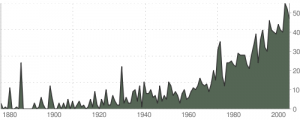Thanks to Willard, I’m reading Mihajlo Idvorski Pupin’s Romance of the Machine, a defense of American materialism, science and engineering. He identifies 3 sets of technologies that have consolidated the Union – the telephone, the vacuum-tube oscillator (radio), and the gas-engine (auto and airplane.) He weaves a consciously idealistic story about engineering mirroring the machines of nature and weaving peace.
The machine is the visible evidence of the close union between man and the spirit of the eternal truth which guides the subtle hand of nature. (p. 29)
It looks like an act of providence that the telephone was born when the consolidation of our Union needed it most; the vacuum-tube oscillator arrived in time to lend its aid in the consolidation of this nation with the other nations of the world. Many an enthusiast believes that these two machines are messengers sent from heaven to aid in the guidance of the destiny of this nation, and of the whole world. This enthusiasm is not surprising. (p. 92)
There is a very interesting chapter (“Romance of the Telephone”, III) where Pupin argues that the telephone provided two important innovations – first the communications network and second a model democratic industry.
There is another epoch-making service which the telephone
rendered to this nation. This service was the creation of a great
American telephone industry, which in many respects serves to-day as a model to other big American industries. (p. 67)
His argument is that ATT is too big to be owned by wealthy families. Instead it is owned by the middle class – people like its employees. He further sees the management as coming from the same middle class and being professionals. He sees a shift from political democracy to economic democracy which benefits all. Whatever happened to that idealism?
Our telephone industry and the other large American industries encourage us in the belief that we are much nearer to the ideal of economic democracy than we are to Lincoln’s ideal of political democracy. The first is developed by scientists and engineers, the second is <pb> in the hands of politicians. (p. 77 – 78)
One thing that happened is a loss of faith in the technocracy. The second thing was a shift in business towards management who saw their mandate narrowly as being only to increase investor value.
Some more quotes:
There will be no place for barbarism, like war, in a world in
which the two American machines, the telephone and the vacuum-tube oscillator, are afforded every opportunity to develop their latent powers for the enlightenment of the world.
Here are two.machines which the American machine civilization has produced, and thus laid the foundation of the radio art, the most subtle and refined of all the technical arts ever conceived by the human mind. No trace of materialism can be detected in their history. On the contrary, their achievements represent them as messengers from heaven sent to earth to rid the world of barbarous notions and raise it to a higher level of civilization.(p. 94)
The telephone, the telegraph, the vacuum-tube oscillator, the aeroplane, and the automobile, will certainly bring the peoples of the world closer to each other and establish between them bonds of friendship, just as they are establishing them between the peoples of our States. That is the highest mission of these machines. (p. 103)
The book ends by talking about “The Great American Experiment” and how this political experiment inspired engineers and scientists to develop technologies to consolidate the Union so that “The designers, the builders, and the machines employed by them are the inseparable parts of the American machine civilization.” (p. 111)
Bibliographic Reference: Michael Pupin, Romance of the Machine (New York: Charles Scribner’s Sons, 1930).



